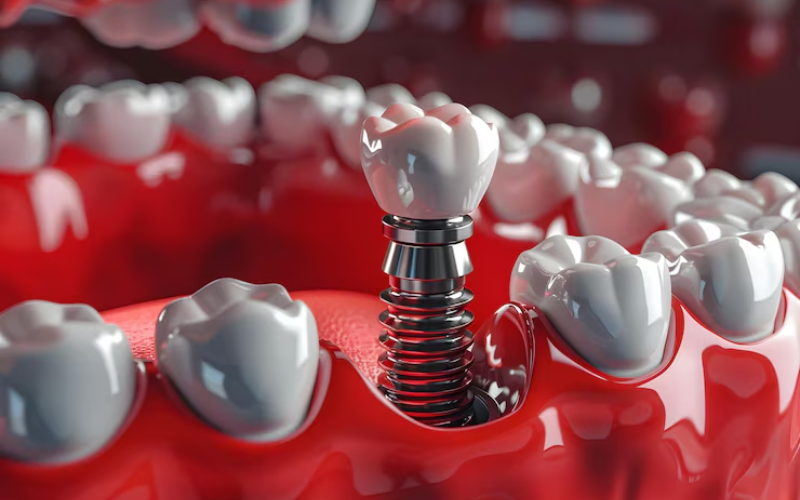Dental implants have become a popular and effective solution for replacing missing teeth. They provide a long-lasting and natural-looking alternative to dentures and bridges. However, like any surgical procedure, dental implants recovery requires a measured period.
Understanding the normal recovery time for dental implants, along with factors that may influence it, can help patients manage their expectations and take steps for a smooth healing process.
Today’s blog will discuss the typical recovery timeline, factors that affect healing, and tips for a faster recovery.
What Are Dental Implants?
Dental implants are artificial tooth roots made of titanium that are surgically placed into the jawbone. Once the implant integrates with the bone through a process called osseointegration, it provides a stable base for a dental crown, bridge, or denture.
The procedure involves multiple stages, including placing the implant, allowing time for healing, and attaching the prosthetic tooth.
Key Stages of Dental Implant Surgery
The dental implant process typically involves three key stages:
- Initial Consultation and Treatment Planning: The dentist will assess your oral health, take X-rays, and develop a customized treatment plan.
- Implant Placement Surgery: The implant is surgically inserted into the jawbone. This is followed by a healing period that allows the implant to integrate with the bone.
- Placement of the Abutment and Crown: Once the implant is fully integrated, the abutment (a connector piece) is placed, followed by the custom crown or denture.
What Is the Normal Recovery Time for Dental Implants?
The recovery time for dental implants varies from patient to patient, depending on various factors such as overall health, bone density, and oral hygiene. Typically, the total recovery time can range from 3 to 6 months. This includes both the time needed for the implant to fuse with the bone and the healing of the soft tissues around the implant.
Immediate Recovery After Surgery: 1-2 Weeks
Immediately following the implant surgery, the initial phase of recovery usually takes 1-2 weeks. During this period, patients may experience mild discomfort, swelling, bruising, and minor bleeding.
The dentist will prescribe pain medications or suggest over-the-counter pain relievers to manage discomfort. During this phase, it is important to follow aftercare instructions closely to prevent infection and ensure proper healing.
Common symptoms during the first week
- Swelling around the implant site
- Bruising of the gums or facial skin
- Minor bleeding
- Discomfort or soreness
- Difficulty chewing or talking
Most patients can return to work within 1-3 days after the surgery, but strenuous activities should be avoided for at least a week to prevent complications.
Osseointegration Phase: 3-6 Months
The next phase of recovery, known as osseointegration, is the period during which the dental implant fuses with the jawbone. This process is crucial for the long-term success of the implant and can take anywhere from 3 to 6 months. The length of time depends on individual factors such as bone density, the location of the implant, and the patient’s overall health.
Key factors that influence osseointegration
- Bone Density: Patients with sufficient jawbone density usually experience faster healing, while those with low bone density may require bone grafts, which extend the healing period.
- Health and Lifestyle: Smoking, poor nutrition, and conditions like diabetes can slow down the healing process.
- Location of Implant: Implants placed in the lower jaw typically heal faster than those in the upper jaw due to differences in bone structure.
During the osseointegration phase, patients will have follow-up appointments to monitor progress. Though there is minimal discomfort during this period, it is essential to maintain good oral hygiene and follow the dentist’s instructions.
Final Placement of the Crown or Denture: 1-2 Weeks
Once osseointegration is complete and the implant is fully integrated with the bone, the final stage involves placing the abutment and crown or denture. This phase typically takes 1-2 weeks and does not require as much recovery time. After this step, patients can enjoy full function of their new teeth.
Factors That Can Affect Dental Implant Recovery
The total period following dental implants recovery can be influenced by a number of factors:
- Bone Grafts: In some cases, patients may require bone grafts to strengthen the jawbone before implant placement. This adds several months to the overall recovery timeline.
- Number of Implants: Patients receiving multiple implants or full-mouth restoration may have a longer recovery period compared to those receiving a single implant.
- Oral Health: Patients with good oral health and strong jawbones usually heal faster than those with underlying dental conditions like gum disease or bone loss.
- Lifestyle Habits: Smoking, alcohol consumption, and poor nutrition can delay healing. Quitting smoking and maintaining a healthy diet can promote faster recovery.
- Complications: Although rare, complications such as infection, implant failure, or nerve damage can prolong recovery.
Tips for a Smooth Recovery
To ensure a successful recovery, it’s important to follow the dentist’s post-operative care instructions. The following tips might help encourage quicker healing:
- Practice Good Oral Hygiene: Brush and floss carefully around the implant site to prevent infection. Use mouthwash with antibacterial properties if your dentist recommends it.
- Follow a Soft Food Diet: For the first few days after surgery, stick to soft foods like yogurt, soup, and mashed potatoes to avoid putting pressure on the implant site.
- Avoid Smoking and Alcohol: Smoking and alcohol can interfere with the healing process and increase the risk of complications.
- Manage Swelling and Discomfort: Use ice packs to reduce swelling and take prescribed pain medications to manage discomfort.
- Attend Follow-Up Appointments: Regular dental visits are crucial to monitor your recovery progress and address any concerns.
- Avoid Strenuous Activity: Rest and avoid heavy lifting or vigorous exercise for at least a week after surgery to prevent unnecessary strain on the implant site.
Signs of Complications To Watch Out for
While dental implant surgery is generally safe and effective, it’s important to be aware of potential complications. If you encounter any of the following symptoms, get in touch with your dentist:
- Persistent swelling or pain beyond two weeks
- Excessive bleeding
- Implant mobility (feeling like the implant is loose)
- Pus or foul odor at the implant site
- Fever or flu-like symptoms
These signs could indicate infection or implant failure, and early intervention can help prevent more serious complications.
The time for dental implants recovery can vary based on individual factors, but most patients can expect a healing period of 3 to 6 months. The initial discomfort typically subsides within the first 1-2 weeks, followed by a longer period of osseointegration, where the implant fuses with the jawbone.
If you’re considering dental implants, consult with your dentist to discuss your individual recovery timeline and ensure the best possible outcome for your oral health and smile.

